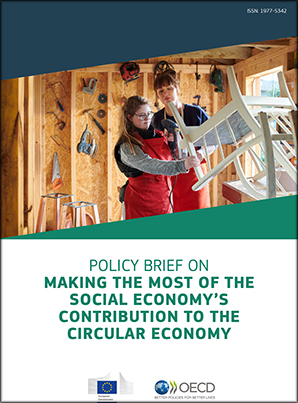OECD and the European Commission have produced a policy brief on the social economy and its contribution to the circular economy. The brief defines concepts of both the circular and social economy and describes the potential of the social economy to support circular activities and related business models and to reinforce uptake of circularity in our economies and societies. It finally identifies policy orientations that build on the complementarity of the social and circular economies, and help the social economy support circularity and drive a green and inclusive transition.
The document finds that Social economy organisations have played pioneering roles for decades in shaping and expanding circular economy activities and practices. By prioritising social impact over maximisation of return on capital, these organisations are able to reinvest some profits in the pursuit of their social or environmental purpose.
The social economy has contributed to the circular economy through activities such as electronics and textile recycling, reusable consumer goods, and repair and remanufacturing activities that extend the lifespan of materials and products. It also contributes to other circular activities such as restoring natural ecosystems, optimizing the use of resources through eco-design of products and supporting the collaborative economy through sustainable platforms.
Social economy organisations’ engagement in circular value chains also reinforces social inclusion. In addition to reducing environmental impacts, the social economy contributes to decent work and provides training and working opportunities for vulnerable groups.
The paper concludes that policy makers can accelerate the development and expansion of the circular economy by supporting social economy entities to build back better in the current COVID-19 context. Policy action can:
- Promote social economy integration into the circular economy by raising awareness, sharing knowledge, boosting market demand or encouraging innovation.
- Support social economy actors already active in the circular economy, such as through public procurement and improved access to finance.
- Encourage dialogue, strategic partnerships and novel forms of collaboration amongst public actors, social economy organisations and businesses along value chains and within territories.
- Help build the evidence base and produce robust data on social economy organisations active in the circular economy to measure their full economic value as well as their social and environmental benefits.
The paper was drafted by Julie Rijpens, Policy Analyst at the OECD Centre for Entrepreneurship, SMEs, Regions and Cities (CFE) with expert input from Thomas Bauwens, Senior Researcher and Lecturer at Utrecht University’s Copernicus Institute of Sustainable Development. The paper was drafted under the supervision of Antonella Noya, Head of the Social Economy and Innovation Unit, with the guidance of Karen Maguire, Head of the Local Employment, Skills and Social Innovation Division (CFE). It is produced as part of the Local Employment and Economic Development Programme (LEED) of the OECD.
The policy brief is part of a grant agreement on policies for inclusive and social entrepreneurship between the LEED Programme of the OECD and the Directorate General for Employment, Social Affairs and Inclusion of the European Commission (DG EMPL).







